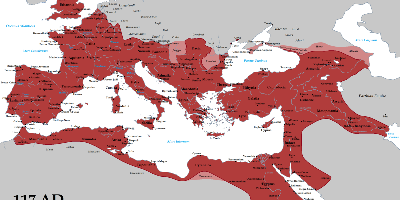1 janv. 59 av. J.-C. - Consulship of Julius Caesar
Description:
In 60 BC, Caesar sought election as consul for 59 BC, along with two other candidates. The election was sordid – even Cato, with his reputation for incorruptibility, is said to have resorted to bribery in favour of one of Caesar's opponents. Caesar won, along with conservative Marcus Bibulus.Caesar was already in Marcus Licinius Crassus' political debt, but he also made overtures to Pompey. Pompey and Crassus had been at odds for a decade, so Caesar tried to reconcile them. The three of them had enough money and political influence to control public business. This informal alliance, known as the First Triumvirate, was cemented by the marriage of Pompey to Caesar's daughter Julia. Caesar also married again, this time Calpurnia, who was the daughter of another powerful senator.
Caesar proposed a law for redistributing public lands to the poor—by force of arms, if need be—a proposal supported by Pompey and by Crassus, making the triumvirate public. Pompey filled the city with soldiers, a move which intimidated the triumvirate's opponents. Bibulus attempted to declare the omens unfavourable and thus void the new law, but he was driven from the forum by Caesar's armed supporters. His lictors had their fasces broken, two high magistrates accompanying him were wounded, and he had a bucket of excrement thrown over him. In fear of his life, he retired to his house for the rest of the year, issuing occasional proclamations of bad omens. These attempts proved ineffective in obstructing Caesar's legislation. Roman satirists ever after referred to the year as "the consulship of Julius and Caesar."
When Caesar was first elected, the aristocracy tried to limit his future power by allotting the woods and pastures of Italy, rather than the governorship of a province, as his military command duty after his year in office was over. With the help of political allies, Caesar secured passage of the lex Vatinia, granting him governorship over Cisalpine Gaul (northern Italy) and Illyricum (southeastern Europe). At the instigation of Pompey and his father-in-law Piso, Transalpine Gaul (southern France) was added later after the untimely death of its governor, giving him command of four legions. The term of his governorship, and thus his immunity from prosecution, was set at five years, rather than the usual one. When his consulship ended, Caesar narrowly avoided prosecution for the irregularities of his year in office, and quickly left for his province.
Ajouté au bande de temps:
Date:
1 janv. 59 av. J.-C.
Maintenaint
~ Il y a 2086 ans
